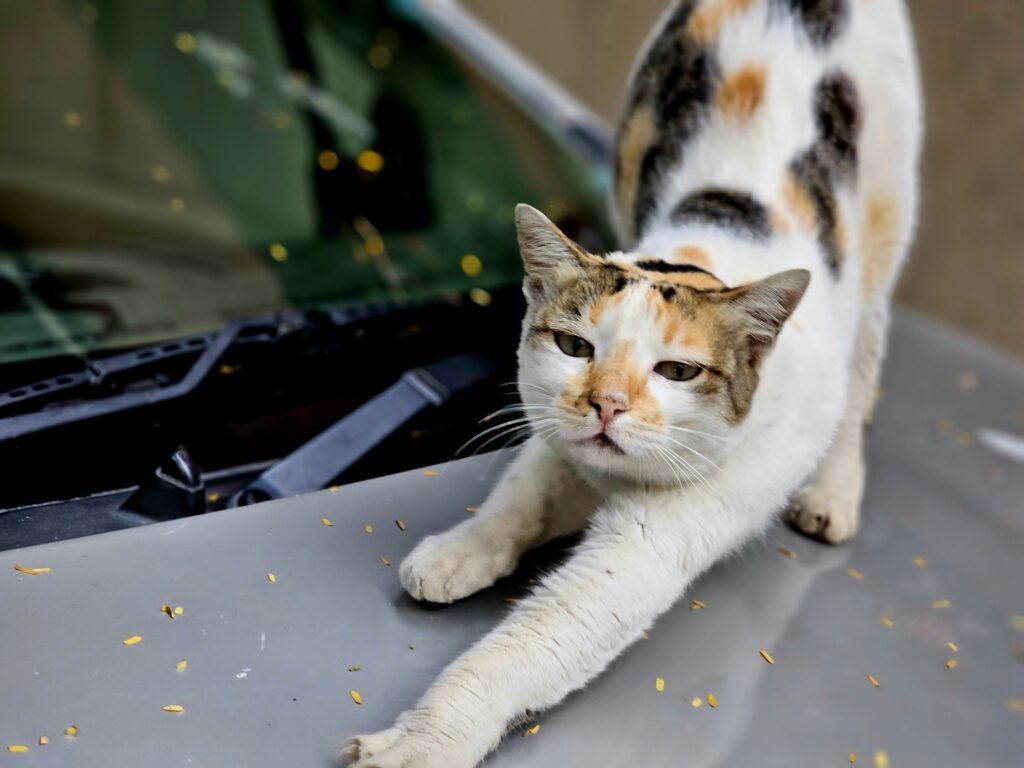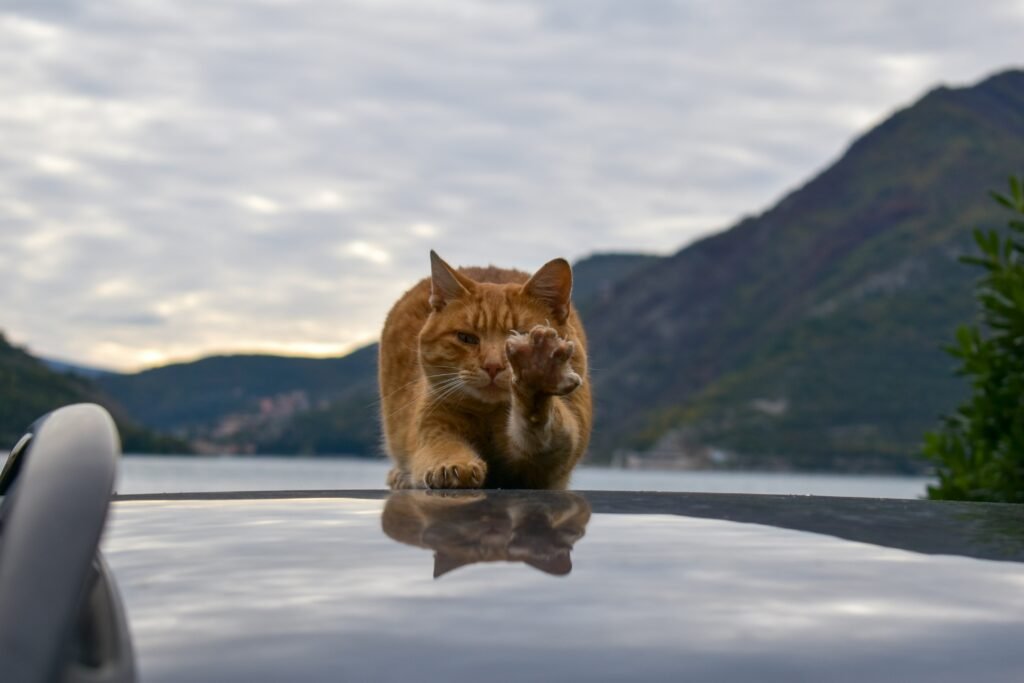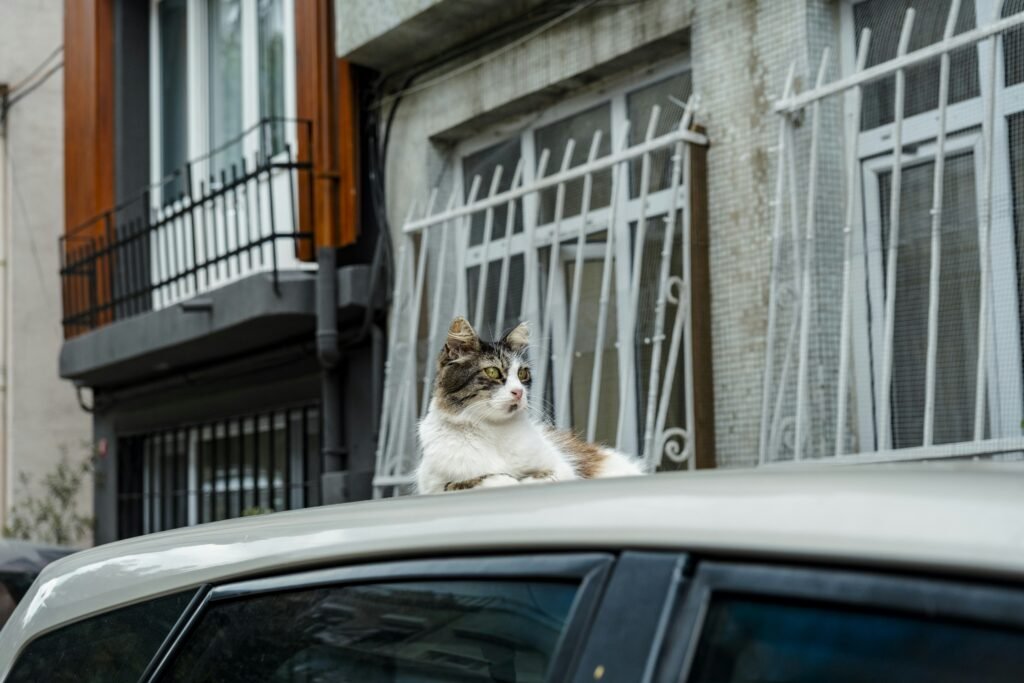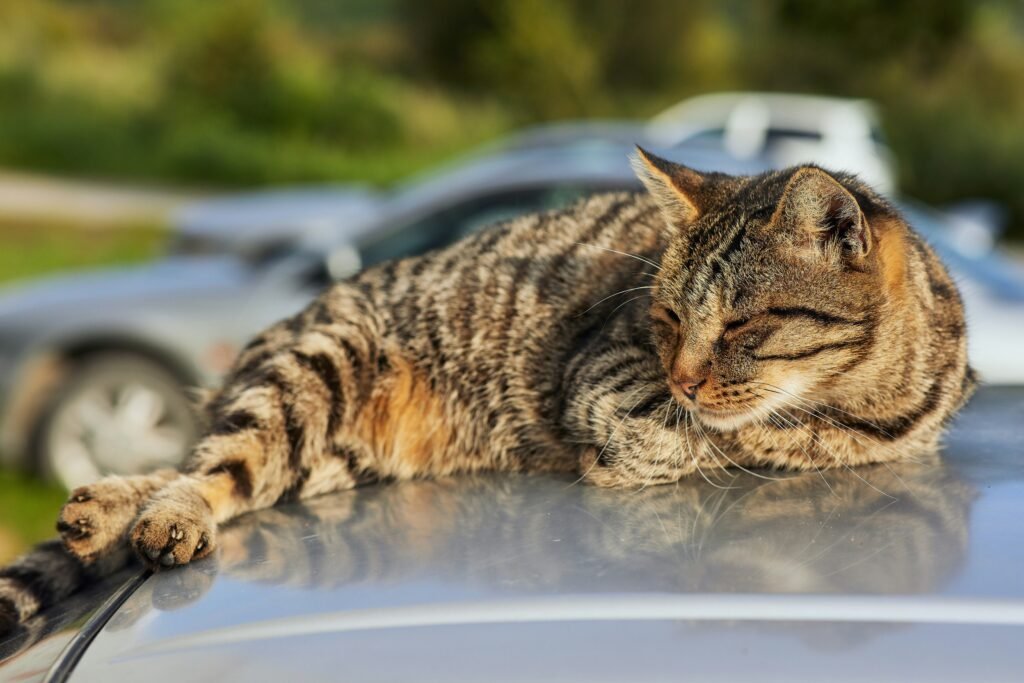You’re running late for work. Your boss is texting you. You grab your coffee and sprint out the door … only to find the neighbor’s cat comfortably sleeping on the hood of your car.
Resist the urge to throw something, and read on.
Cats are territorial, habitual creatures, and for some reason, your neighbor’s feline has decided it now owns your vehicle. While it might seem harmless, a cat regularly sleeping on your car can lead to various issues, such as scratches, dents, and hygiene concerns — not to mention a nuisance when you’re running late.
Why do cats sleep on cars? This article aims to explore the reasons behind this feline behavior and provide practical solutions for preventing neighborhood cats from making your vehicle their favorite napping spot.

Why do cats sleep on cars?
Of all the places your neighbor’s cat could catch some Z’s, why on earth does it choose your vehicle? What makes a hunk of metal so comfortable, anyway?
- Warmth from the car’s surface. Cats are attracted to warm places, and a car’s hood, roof or engine can provide a cozy spot for them to sleep, especially during colder months or on sunny days. After a car has been driven, the engine remains warm for some time, creating an inviting atmosphere for cats seeking comfort. If the sun’s out, your car might be the warmest spot around.
- Elevated vantage point. Cats instinctively prefer high places as they offer a sense of security and a better view of their surroundings. The hood or roof of a car provides an elevated spot for cats to survey their territory and feel safe while resting.
- Sense of security. A car’s smooth, flat surface can give cats a sense of stability and security. The confined space on top of a car can make them feel protected from potential predators or other disturbances.
Besides the obvious annoyance, a neighbor’s cat sunning itself on your vehicle can actually cause a few issues if not addressed promptly.
Potential damage to your vehicle
When a cat sleeps on your car, it might inadvertently cause damage to the vehicle. Cats’ claws can scratch the paint, leave marks on the windshield, or even dent the hood or roof if the cat jumps onto the car with force. Over time, these small scratches and dents can accumulate, leading to costly repairs or detract from the appearance of your vehicle.
Hygiene and allergy concerns
Cats might leave behind hair, dander, and even urine or feces on your car. This can create an unpleasant odor and may trigger allergies in some individuals. If the neighbor’s cat is a frequent car-napper, the accumulation of hair and dander can clog air vents or other openings, potentially affecting the car’s performance.
Inconvenience
Having to constantly remove cat hair, clean paw prints, or shoo away the cat can be frustrating and time-consuming, especially if the cat isn’t keen to listen to your commands. If you are in a rush and need to use your car, finding that the neighbor’s cat has made it their temporary bed isn’t usually a welcome surprise.

Why does the neighbor’s cat choose my car, instead of its owner’s car?
Territorial behavior. Cats are territorial animals, and they might choose to sleep on your car as a way to mark their territory. By leaving their scent on your vehicle, they are claiming it as part of their domain. If you have recently driven your car or if there are certain scents on your vehicle (e.g., food odors or even your own scent), it might also attract the cat to your car over others.
Convenience and accessibility. The location of your car might be more convenient or accessible for the cat compared to their owner’s vehicle. If your car is parked closer to the cat’s favorite spots or if it’s easier for them to jump onto your car, they might prefer it as a sleeping spot. In addition, cats are natural predators, and the elevated position on top of a car can appeal to their hunting instincts. It provides a high vantage point from which they can observe their surroundings and potential prey.
How to make your car less attractive to sleepy cats
Use humane deterrents
One effective way to discourage cats from sleeping on your car is to use humane deterrents. These methods can help create an uncomfortable environment for the cat without causing any physical harm.
- Motion-activated sprinklers can startle cats with a sudden burst of water when they approach your vehicle.
- Ultrasonic devices emit high-frequency sounds that are unpleasant for cats but not harmful to them or humans.
- Certain scents such as citrus fruits like lemons and limes, as well as vinegar, are known to be unappealing to cats. Cats have a strong sense of smell and can be deterred by certain smells. You can place slices of citrus fruits or spray a diluted vinegar solution around your car to discourage the cat from sleeping on it. There are also commercial cat repellents available that mimic the scent of predators, which can help keep cats away.
- Covering the car when not in use. If you have a garage or carport, parking your car inside can prevent cats from accessing it. If indoor parking is not an option, using a car cover when the vehicle is not in use can be an effective deterrent. Ensure the cover is securely fastened to prevent the cat from crawling underneath it.

Park in another location
The most effective way to prevent a cat from sleeping on your car is to park it in a garage or carport. This physical barrier will prevent the cat from having access to your vehicle. Of course, you probably thought of that already.
If you must park outdoors, choose well-lit, busy areas. Cats prefer quiet, secluded spots for sleeping, so parking in a busy area with a lot of foot traffic or closer to the road can discourage them from napping on your car.
If you have the option, try parking your car in different spots regularly. This will make it harder for the cat to establish a routine and might encourage them to find another location to take their cat naps.
Creative approaches to deter cat napping
- Creating a designated sleeping area for the cat. Work with your neighbor to create a comfortable, alternative sleeping spot for their cat. This could be a cozy bed or a cat house placed in a quiet corner of their yard, away from your car. Encourage the use of catnip or treats to make the new sleeping area more appealing to the cat.
- Using double-sided tape or sticky mats. Place double-sided tape or sticky mats on the surfaces of your car where the cat typically sleeps. Cats dislike the feeling of stickiness on their paws and will likely avoid jumping onto your car. Be sure to use products that are safe for your car’s paint and finish.
- Installing motion-activated alarms or lights. Motion-activated alarms or lights can startle the cat when it approaches your car, discouraging it from sleeping on your vehicle. These devices can be placed on your car or nearby and will be triggered when the cat comes close.

Talk to your neighbor about their cat’s behavior
Your neighbor might not be aware their cat’s sleeping habits are affecting you, so it might be worth a conversation. Approach the issue politely and diplomatically, and avoid being confrontational or accusatory. Cats are notoriously finicky, so even if your neighbor is aware, they might not be able to do much. Suggest that they provide alternative sleeping spots for their pet, such as a comfortable bed or cat house in their yard. Offer to work together to create a solution that works for both parties.
Especially if you plan to implement any deterrent methods, inform your neighbor of your intentions and give them a chance to be part of the solution.
Dealing with a neighbor’s cat sleeping on your car can be a frustrating experience, but it’s important to remember that the cat is not acting out of malice. Cats are drawn to cars for various reasons, including warmth, security, and territorial instincts. By understanding these motivations, you can take steps to prevent the cat from making your car its regular napping spot. With patience and persistence, you can keep your car free from feline visitors and maintain a good relationship with your neighbor.

